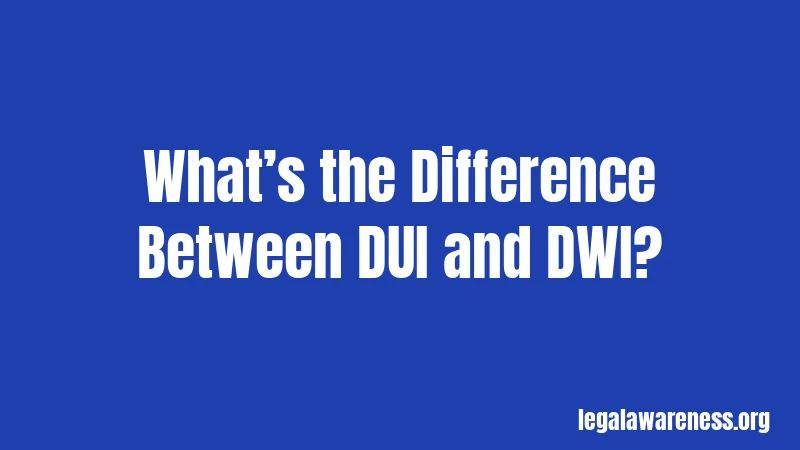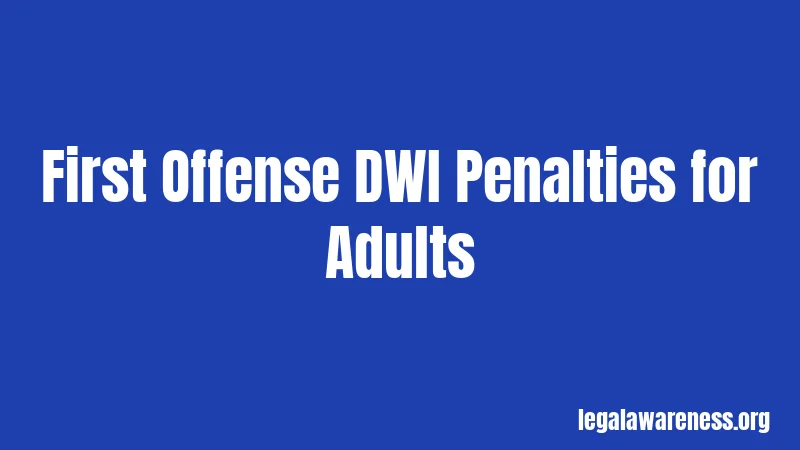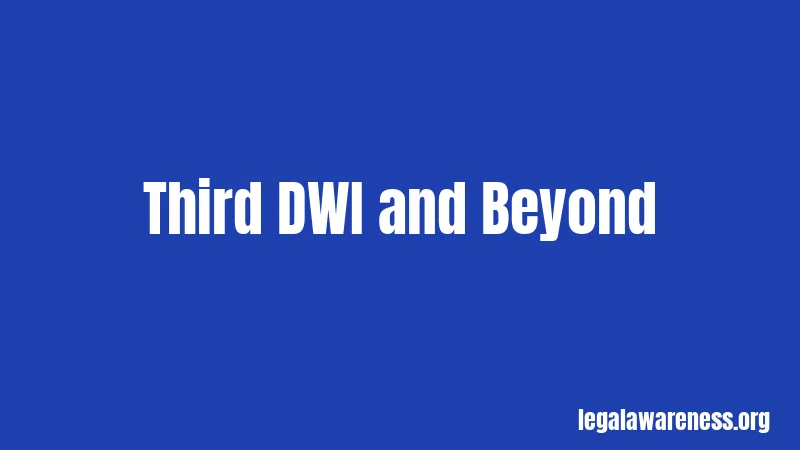DUI Laws in Texas (2026): Penalties Are Stricter Than Ever
Most people don’t realize how harsh Texas is about drunk driving. Seriously. Even one drink can land you in legal trouble if you’re under 21. And if you’re over 21? The penalties just got tougher in 2025.
Let me break down exactly what you need to know about DUI and DWI laws in Texas. Trust me, this stuff matters.
What’s the Difference Between DUI and DWI?

Here’s something that confuses people all the time.
In Texas, DUI and DWI are actually different charges. A DUI applies only to people under 21. A DWI applies to anyone operating a vehicle while intoxicated.
Think of it this way. If you’re under 21, Texas has zero tolerance. Any detectable amount of alcohol means you’re breaking the law. We’re talking about even a trace amount, like 0.01% blood alcohol concentration.
For adults 21 and over? You’re legally intoxicated at 0.08% BAC. But officers can still arrest you below that level if they believe alcohol affects your driving ability.
Pretty straightforward, right?
Texas Zero Tolerance Law for Minors
Okay, this one’s critical if you’re under 21.
Texas has what’s called a Zero Tolerance Law. It makes it illegal for anyone under 21 to drive with any detectable alcohol in their system. Any amount. Even half a beer can trigger a charge.
The legal limit for adults is 0.08%. For minors? There is no safe amount.
If an officer suspects you have alcohol in your system, they can arrest you. Your vehicle can be towed. Your license can be suspended for 60 days on the first offense.
Wait, it gets more serious.
If your BAC reaches 0.08% or higher as a minor, you face the same DWI charges as adults. Plus additional penalties for being underage. The consequences stack up fast.
First Offense DWI Penalties for Adults

Let’s talk about what happens if you’re 21 or older and get your first DWI.
As of September 1, 2025, penalties got harsher. Senate Bill 2320 increased the classification for certain DWI offenses.
Here’s what you’re looking at for a first offense:
If your BAC is below 0.15%:
- Class B misdemeanor
- Up to $2,000 fine
- 72 hours to 180 days in jail (with a minimum 72-hour sentence)
- License suspension for 90 days to one year
If your BAC is 0.15% or higher:
- Class A misdemeanor (this changed in 2025)
- Up to $4,000 fine
- 30 days to one year in jail
- License suspension for up to two years
- Mandatory ignition interlock device
Honestly, that BAC level of 0.15% makes a huge difference. That’s nearly twice the legal limit.
You’ll also face additional costs beyond the fines. Court costs, attorney fees, alcohol education programs, and increased insurance rates all add up quickly. Some people end up paying $10,000 or more total.
Second DWI Offense
A second DWI is where things get really expensive.
This is automatically a Class A misdemeanor. The penalties include:
- Up to $4,000 fine
- One month to one year in jail
- License suspension for 180 days to 18 months
- Mandatory ignition interlock device
Hold on, this part is important.
Courts now have broader authority to impose continuous alcohol monitoring. You might need to wear an ankle monitor. You’ll probably face longer probation periods and more frequent court check-ins.
Third DWI and Beyond

Yep, this one’s no joke.
A third DWI is a third-degree felony in Texas. The penalties jump significantly:
- Up to $10,000 fine
- 2 to 10 years in prison
- License suspension for up to two years
- Permanent criminal record
Under the 2025 updates, repeat felony DWI offenders may face enhanced sentencing if the offense occurs within ten years of a prior felony DWI.
What About DWI with a Child in the Car?
This is a separate charge called child endangerment.
If you’re driving impaired with a passenger under 15 years old, you face additional charges:
- Up to $10,000 fine
- State jail felony
- Two to 10 years in prison
- Additional 180-day license suspension
These penalties apply on top of your regular DWI charges. Basically, you’re looking at double the trouble.
Ignition Interlock Devices Explained
So what exactly is an ignition interlock device?
It’s a breathalyzer installed in your car. You blow into it before starting the vehicle. If it detects alcohol above a certain level, your car won’t start.
Here’s when you’ll need one:
- First DWI with BAC of 0.15% or higher (mandatory)
- Any second or subsequent DWI (mandatory)
- DWI with a child passenger (mandatory)
- Sometimes as a condition of probation or to get an occupational license
The device costs roughly $100 to install. Then you pay $2.50 to $3.50 per day to lease it. That adds up to about $75 to $105 per month.
The device also requires random breath samples while you’re driving. If you don’t provide a sample or if alcohol is detected, alarms go off. Lights flash. The horn sounds. All breath samples are logged and accessible to the court.
Pretty intense, right?
Administrative License Revocation (ALR)
Here’s something people don’t always realize.
Your license can be suspended immediately after arrest, even before you’re convicted. This is called Administrative License Revocation.
If you refuse a breath or blood test, your license is suspended for:
- 180 days for a first refusal
- Two years for a subsequent refusal within 10 years
You have only 15 days from your arrest to request an ALR hearing. Miss that deadline and your license is automatically suspended.
Wondering if you should refuse the test? There’s no easy answer. Refusing triggers automatic suspension. But test results can be used against you in court.
Penalties for Underage DUI
Let’s break down what happens if you’re under 21 and get caught.
First offense (under 17):
- Class C misdemeanor
- Up to $500 fine
- 20 to 40 hours of community service
- License suspension for 60 to 180 days
- Mandatory alcohol awareness course
First offense (17 to 20):
- Class B misdemeanor
- Up to $2,000 fine
- 72 hours to 180 days in jail
- License suspension for one year
Second offense:
- Up to $500 fine (if under 17)
- Up to 60 hours of community service
- License suspension for 120 days to two years
Sound complicated? It’s actually not. The main thing to remember is this: any alcohol equals trouble if you’re under 21.
Can You Get a DWI Reduced or Dismissed?
Sometimes, yes.
An experienced attorney might get charges reduced or dismissed if:
- The traffic stop was illegal
- Field sobriety tests were administered incorrectly
- The breathalyzer wasn’t properly calibrated
- Blood samples weren’t handled correctly
- Your rights were violated
Deferred adjudication is also possible for first-time offenders. This keeps the conviction off your permanent record if you complete probation successfully.
Refusing a BAC Test
Texas has an “implied consent” law.
By operating a vehicle in Texas, you automatically consent to BAC testing if arrested for DWI. Refusing means:
- Immediate license suspension
- Evidence of refusal can be used against you in court
- Police can still get a warrant to force a blood draw
Honestly, refusing doesn’t protect you the way some people think it does.
Open Container Laws
Even if you’re not driving drunk, having open alcohol in your vehicle is illegal.
Texas law prohibits open containers of alcohol in the passenger area of a vehicle. This applies whether you’re the driver or a passenger.
Exception: Open containers are allowed in the living quarters of motorhomes or in vehicles for hire like limousines or party buses.
Enhanced Penalties You Should Know About
Certain situations trigger harsher penalties:
DWI with an open container:
- Minimum six-day jail sentence
- Class A misdemeanor (changed in 2025)
Intoxication assault (causing serious injury):
- Third-degree felony
- Up to $10,000 fine
- Up to 10 years in prison
Intoxication manslaughter (causing death):
- Second-degree felony
- Up to $10,000 fine
- 2 to 20 years in prison
These are the cases that change lives forever.
What to Do If You’re Arrested for DWI
Okay, pause. Read this carefully.
If you’re arrested for DWI in Texas:
Stay calm and polite. Anything you say can be used against you. Don’t argue with the officer or admit guilt.
Request an ALR hearing within 15 days. This is critical for fighting your license suspension.
Contact a DWI defense attorney immediately. The sooner you get legal help, the better your chances.
Don’t discuss your case with anyone except your attorney. Not friends, not family, not on social media.
Getting Your License Back
After a DWI conviction, reinstating your license requires several steps:
Complete any required alcohol education program. Texas offers 12-hour and 32-hour DWI education courses.
Serve your suspension period. This varies based on the offense.
Pay reinstatement fees. Typically around $100 to $125.
File an SR-22 certificate. This proves you have proper insurance coverage.
If required, install an ignition interlock device before driving.
Wait, it gets better. Some offenders qualify for an occupational license during suspension. This allows limited driving for work, school, or essential household duties.
Recent Changes to Texas DWI Laws
Let me tell you what changed in 2025.
Senate Bill 2320 increased penalties for certain DWI offenses starting September 1, 2025. The big changes:
- Standard first DWI upgraded from Class B to Class A misdemeanor
- DWI with BAC of 0.15%+ upgraded from Class A misdemeanor to state jail felony
- Minimum jail sentences added for certain offenses
Texas also eliminated the Driver Responsibility Program surcharges in 2019. This saved offenders from paying annual fees on top of other penalties. However, the total cost of a DWI conviction is still substantial.
DWI and Your Future
A DWI conviction stays on your criminal record. This means:
Background checks for employment will show your conviction. Many employers won’t hire someone with a DWI.
College admissions can be affected. Some schools ask about criminal history.
Professional licenses may be denied or revoked. Teachers, nurses, and commercial drivers face serious consequences.
Car insurance rates skyrocket. You’ll pay higher premiums for years.
You might struggle to rent an apartment. Many landlords conduct background checks.
Most people don’t realize how long these consequences last. They can affect you for life.
Commercial Drivers and DWI
Commercial driver’s license holders face stricter standards.
The legal BAC limit for CDL holders is 0.04%, not 0.08%. That’s half the regular limit.
A DWI conviction results in:
- Loss of CDL for one year (first offense)
- Lifetime CDL disqualification (second offense)
- Permanent career damage
Basically, one DWI can end your career as a commercial driver.
Out-of-State Drivers
Texas DWI laws apply to everyone driving in the state.
You don’t have to be a Texas resident. You don’t need a Texas license. If you’re arrested in Texas, you face Texas penalties.
Your home state will also be notified. Most states suspend your license based on out-of-state DWI convictions.
The Real Cost of a DWI
Let’s talk numbers.
Beyond fines and fees, you’ll pay for:
- Attorney fees: $3,000 to $10,000+
- Court costs: $500 to $1,000
- Alcohol education programs: $30 to $300
- License reinstatement: $100 to $125
- SR-22 insurance: Hundreds more per year
- Ignition interlock device: $1,000+ per year
- Lost wages from jail time and court appearances
- Increased insurance premiums
Many people end up spending $15,000 to $20,000 total. Some spend much more.
Frequently Asked Questions
Can I get a DWI while parked?
Yes, you can. Texas law says you’re “operating” a vehicle if you’re in actual physical control. This means sitting in the driver’s seat with keys in the ignition, even if the car isn’t moving.
What happens if I’m visiting Texas from another state?
Texas laws apply to everyone driving here. You’ll face the same penalties as Texas residents. Your home state will be notified and may take additional action against your license.
Do I have to take a field sobriety test?
No, field sobriety tests are voluntary. However, refusing can give officers additional probable cause for arrest. The officer can still arrest you based on other observations.
Will a DWI show up on background checks?
Yes, DWI convictions are part of your permanent criminal record. They appear on employment background checks, rental applications, and professional license applications.
Can I get my DWI record expunged?
Generally no. Texas doesn’t allow expunction of DWI convictions. However, if your case was dismissed or you were acquitted, you may qualify for expunction. Deferred adjudication cases may qualify for non-disclosure orders.
Final Thoughts
Texas takes drunk driving seriously. The penalties are harsh and getting harsher.
If you’re under 21, any amount of alcohol is illegal. If you’re over 21, stay well under 0.08%. Better yet, don’t drink and drive at all.
Got arrested? Get a lawyer immediately. Request your ALR hearing within 15 days. Don’t try to handle this alone.
Now you know the basics. Stay safe out there.
References
- Texas Penal Code § 49.04 – Driving While Intoxicated – https://statutes.capitol.texas.gov/Docs/PE/htm/PE.49.htm
- Texas Department of Public Safety – DWI Information – https://www.dps.texas.gov/
- Texas Department of Transportation – Impaired Driving Laws and Penalties – https://www.txdot.gov/safety/driving-laws/impaired-driving.html
- Texas Senate Bill 2320 (2025) – Enhanced DWI Penalties – https://capitol.texas.gov/BillLookup/History.aspx?LegSess=89R&Bill=SB2320
- Texas Transportation Code § 521.246 – Ignition Interlock Requirements – https://statutes.capitol.texas.gov/Docs/TN/htm/TN.521.htm
